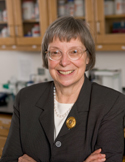
November 19, 2007 |
Clairmont Campus being examined for health sciences development |
|||||
Over the past several years, a significant amount of effort has been put into facility planning for The Emory Clinic and for Emory hospitals. I am grateful for the hard work that has gone into these planning efforts. It is important before proceeding that we review the planning and decisions that have been developed and to evaluate potential scenarios for future facilities on the Emory main campus sites on Clifton and Clairmont Roads and at the Emory Midtown campus. This review is prompted by our desire to ensure the best long-term outcomes for patient quality and care, and it will be assessed based on a strategic framework designed to guide and direct the distribution and integration of clinical (outpatient and inpatient) care, research, and education programs across the Woodruff Health Sciences Center. I have appointed planning teams of unit administrators, faculty, and health sciences leadership to evaluate the Clairmont campus option, among others, to consider it as the site for the new Emory Clinic, hospital, and research facilities as an alternative site to the current plan of redeveloping these facilities on Clifton Road. To accomplish this view, I have appointed planning teams of unit administrators, faculty, and health sciences leadership to evaluate our options for locating the new Emory Clinic, hospital, and research facilities. These planning teams include an executive team led by John Fox, Wright Caughman, and David Stephens, plus a working team and a scenario testing team. We are taking this opportunity in the facilities development timetable to deliberate thoughtfully to make sure we make the best possible decisions for the site selections—for the near term and for many decades to come. We will keep you updated on program and facility planning developments throughout this process. The scenarios will be presented on January 10, and following subsequent reviews, a formal plan will be presented to the trustees at their March meeting. I appreciate your help and engagement in ensuring that we develop the best clinical and academic facilities to support our programs, mission, and vision to transform health and healing. |
||||||
| Emory University Hospital expands at Northlake
To help provide Emory University Hospital additional space for patient care, the University has signed an agreement that will lead to the purchase of the former Northlake Hospital in the near future. This 120-bed facility located in DeKalb County on Montreal Drive (near I-285 and Lawrenceville Hwy) will be called Emory University Hospital Northlake. Subject to regulatory approval, the hospital initially will include a small medical inpatient unit (diagnostic services as well as support services required for inpatient care) and will not immediately offer emergency department or other services. As with all new Emory facilities or those under renovation, the hospital will include flexible space to allow us to pursue our teaching and research activities within the clinical environment as well as support innovation in developing new approaches to care and wellness. This acquisition gives us an important site for expansion for all our missions. |
||||||
Emory/Morehouse presidents communicate with hospital authority In a joint letter dated Nov. 8, 2007, to Pamela Stephenson, chair of the Fulton-DeKalb Hospital Authority (FDHA), Emory President James Wagner and Morehouse School of Medicine (MSM) President John Maupin commended her for the exploratory work the FDHA is doing in preparation for a Nov. 26 vote on forming a new nonprofit 501(c)3 corporation to operate Grady Hospital. They expressed hope that the governance change will happen quickly and that it will be an effective means to secure new sources of funding for the hospital, which currently owes the two schools a combined total debt of $63 million. “As you undertake major transformation, we wish to support and encourage your efforts,” the presidents said. “We also want to assist in any way we can with a new governance structure and securing new sources of funding.” The two presidents repeated what Emory and MSM officials have said with increasing urgency for several months—that time is growing short for Grady to move forward with governance and funding changes. Facing the need over the next few months to interview and select new residents for placement at Grady, they said it is necessary for Grady’s situation to be resolved by the end of the calendar year. Under the terms of the National Resident Matching Program, teaching institutions like Emory and MSM identify the number of residency slots they can guarantee by the end of January. However, the process begins in September, with prospective residents applying for their preferred programs. Then the teaching institutions offer interviews and elective courses between November and January. At the end of January, prospective residents must specify their preferences in rank order. The teaching institutions assume ongoing obligations to the residents who have matched for the terms of their residencies, which typically last for three to four years. New residency appointments begin nationwide on July 1 of each year. Emory alone has more than 375 residency slots at Grady, and MSM has 95. “Even as the hospital authority continues its deliberations,” Wagner and Maupin wrote to Stephenson, “Emory and Morehouse are compelled to explore alternative venues for our programs in the event those deliberations are unsuccessful. The process of reviewing alternatives is already under way, so that we might be in a position to begin redeployment as necessary in the new year.” They continued, “We remain cautiously optimistic that we will be able to preserve our historic and productive relationship that has benefited thousands of patients, the counties, and the state as a whole.” Read more online. |
||||||
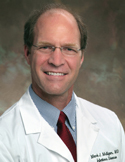 Mark Mulligan, MD |
Emory designated as vaccine and treatment evaluation unit
Emory University has been designated as one of the newest members of a group of eight vaccine and treatment evaluation units (VTEUs), which are funded by the NIH’s National Institute of Allergy and Infectious Diseases. Along with the designation, Emory has received a seven-year contract of approximately $23.7 million, with subcontracts to collaborators at Mayo Clinic, Kaiser Permanente Georgia, University of Colorado, and the CDC. The Georgia Research Alliance will provide a $2 million matching grant to the Emory VTEU. As a VTEU site, Emory and its partner institutions will design and conduct clinical trials of candidate vaccines and therapeutics and related studies in surveillance and epidemiology, policy, and education. Trial participants will include children and adults of all ages, as well as special targeted population groups. Established in 1962, VTEUs conduct clinical trials for all infectious diseases other than HIV/AIDS, which has its own national vaccine and treatment trial networks, for which Emory received designation earlier this year (see press release). VTEU investigators have tested and advanced vaccines for many diseases, including pneumonia, whooping cough, Hemophilus influenzae, cytomegalovirus, malaria, smallpox, anthrax, and tularemia. Childhood vaccines and combination vaccines are an important part of VTEU research. An important strength of the VTEUs is their ability to rapidly recruit, enroll, and retain volunteers and vaccinate them safely, effectively, and quickly. This rapid-response capability is especially important for testing vaccines designed to counteract emerging public health concerns, such as pandemic flu. Mark Mulligan, MD, executive director of the Hope Clinic of the Emory Vaccine Center, is director and principal investigator of the Emory VTEU. Harry Keyserling, MD, and Paul Spearman, MD, (both in pediatrics) are co-directors. Read more online. |
|||||
 Max Cooper, MD |
• Ninth GRA Eminent Scholar recruited to Emory
Emory’s brain power in immunology and vaccines got a major boost with the recent recruitment of Max Cooper, MD, who joins the faculty in January as a Georgia Research Alliance Eminent Scholar. Cooper is credited with a string of landmark discoveries, including the finding that there are two distinct types of white blood cells, now known as T and B lymphocytes, that play separate but cooperative roles in defending against infections. His research on how these cells develop helped establish the framework for classifying leukemias, lymphomas, and inherited immune deficiencies and for understanding the medical problems they cause. Cooper is also a pioneer in developing methods that today enable transplantation of bone marrow and blood stem cells. His most recent research has identified a new type of antibody protein produced by certain fish that may be useful for diagnosing and treating human diseases. Cooper is a member of the National Academy of Sciences and the Institute of Medicine and has been a Howard Hughes Medical Institute Investigator. He received the 3M Life Sciences Award, the Sandoz Prize, and a lifetime achievement award from the American Association of Immunologists. He will be a professor in pathology and laboratory medicine and a member of the Emory Vaccine Center. |
|||||
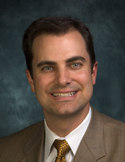 Dane Peterson |
• New COO named for Emory Crawford Long Hospital Dane Peterson, a health care executive from Hospital Corporation of America (HCA) and Tenet health care systems, has been named chief operating officer of Emory Crawford Long Hospital, effective Dec. 12. Peterson comes to Emory Healthcare from Medical City Dallas Hospital, a 677-bed HCA facility where he has served since 2004, most recently as interim COO, since March 2007. Prior to that, he was associate administrator, a role in which he was responsible for day-to-day operations in 12 departments, staffed by more than 600 employees. From 2003 to 2004, Peterson was at Creighton University Medical Center (Tenet) as associate administrator for ancillary services, where he was responsible for management of perioperative and imaging services as well as emergency services throughput improvement. In addition to his experience in administration and operations, he has significant accomplishments in master plan construction and renovation. He holds an MBA from Stanford University, and a bachelor’s in industrial and operations engineering from the University of Michigan. Read more online.
|
|||||
 Marla Salmon, ScD, RN |
• Salmon to serve on NIH council for nursing research Nursing dean Marla Salmon, ScD, RN, has been invited by the U.S. Secretary of Health and Human Services (HHS) to serve a four-year term on the NIH’s National Advisory Council for Nursing Research. The council, which consists of 15 members, advises the HHS Secretary and the National Institute of Nursing Research on matters relating to the conduct and support of research, training, health information dissemination, and other programs with respect to basic and clinical nursing. The Council also reviews applications for grants and cooperative agreements for research and training.
|
|||||
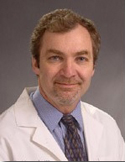 Walter Curran, MD |
• Curran is new chair of radiation oncology and Winship CMO Effective Jan. 14, Walter Curran, MD, is the new chair of Radiation Oncology in the medical school and chief medical officer in the Winship Cancer Institute. Curran comes to Emory from Jefferson Medical College in Philadelphia, where he chaired radiation oncology and was clinical director of the Kimmel Cancer Center. His clinical specialty is aerodigestive and neurologic cancer. This recruitment is a major boost to Winship's ongoing drive toward designation as a National Cancer Institute (NCI) Comprehensive Cancer Center. Curran's appointment helps complete a strong leadership team at Winship, including director Brian Leyland-Jones, MD, deputy directors Fadlo Khuri, MD (clinical and translational research), William Woods, MD (pediatric oncology), Paul Doetsch, PhD (basic research), and Jack Mandel, PhD, MPH (cancer control and population sciences), and surgery chair William Wood, MD. A principal investigator (PI) on numerous NCI grants, Curran chairs or co-chairs 19 clinical protocols and is a reviewer for 12 journals. He is group chair and PI of the NCI-funded Radiation Therapy Oncology Group (RTOG) for clinical trials and research. A fellow in the American College of Radiology, Curran holds honorary memberships in the European Society of Therapeutic Radiology and Oncology and the Canadian Association of Radiation Oncology. In 2006, he was named the leading radiation oncologist/cancer researcher in a peer survey in the journal Medical Imaging. |
|||||
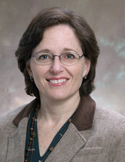 Sarah Putney, JD |
• Putney named director of Emory IRB
Effective Nov. 1, Sarah Putney, JD, was named director of the Emory University Institutional Review Board (IRB) Office. A research oversight committee, the IRB is charged with assuring that appropriate steps are taken to protect the rights and welfare of humans participating as subjects in approved research studies. Putney has served as director of human subjects administration at Harvard School of Public Health for the past six years. She held an adjunct faculty appointment in health policy management, where she taught research ethics and the responsible conduct of research. She also serves as a consultant for the Office for Human Research Protection in the U.S. Department of Health and Human Services. Before coming to Harvard, Putney was coordinator of the human investigations committee at Yale School of Medicine. Read more online. |
|||||
|
• Two Emory scientists named as AAAS fellows
Vaccine scientist Harriet Robinson, PhD, (pictured) and chemist Albert Padwa, PhD, have been elected fellows of the American Association for the Advancement of Science (AAAS), an honor bestowed on AAAS members by their peers. Robinson was elected for her work on retrovirus biology and development of DNA vaccines for HIV/AIDS. She is chair of the Division of Microbiology and Immunology at Yerkes National Primate Research Center and an investigator in the Emory Vaccine Center. Padwa was elected for his contributions to heterocyclic chemistry and its applications, including compounds often used in the pharmaceutical industry. Read more online. |
|||||
 Donna Hyland |
• Hyland named as CEO of Children’s Healthcare
Donna Hyland, currently COO of Children’s Healthcare of Atlanta, will become the new CEO in 2008, replacing veteran CEO James Tally, who is retiring next year. As COO, Hyland has overseen considerable growth at Children’s, which is nearing completion of the largest expansion and renovation project in health care in the state. As a trustee for Children’s Healthcare at Hughes Spalding, Hyland helped oversee the transition of this facility into the Children’s organization. Hyland’s board memberships include the Emory Children’s Center, the Emory-Egleston Children’s Heart Center, and Blue Cross and Blue Shield of Georgia. |
|||||
Symposium focuses on state of the art in predictive health The Emory/Georgia Tech Predictive Health Institute will host its third annual symposium Dec. 17-18 at the Emory Conference Center. Keynote speakers include Howard Hughes Medical Institute Investigator Helen Hobbs, MD, who will discuss genetic protection from coronary artery disease, and Denis Cortese, MD, president and CEO of the Mayo Clinic, who will discuss individualized medicine as the cornerstone of health care. In addition to scientists from Emory and Georgia Tech, the roster includes speakers from the NIH, University of Wisconsin, Johns Hopkins, and the CDC. This year’s theme is “Predictive Health—State of the Art: A Story in Four Parts,” with a first-day focus on defining and measuring health and discovering optimal biomarkers of health. On day 2, presenters will discuss interventions to optimize health and ways to apply new knowledge to individuals and populations worldwide. Registration is $25 for Emory faculty and staff and $10 for students, including materials and lunch, both days. View the entire agenda and register at http://predictivehealth.emory.edu. |
||||||


